Five Critical Considerations to Advance Financial Literacy
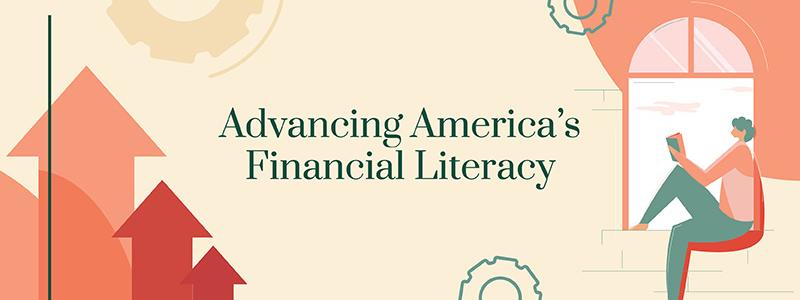
Like many challenges facing society, a silver bullet solution to remedy America’s lack of financial knowledge doesn’t exist. Instead, a multi-pronged approach deployed on multiple fronts is needed to tackle the issue. As the preeminent leader in applied financial knowledge and education, The American College of Financial Services has always been committed to benefiting the financial well-being of society.
Since 1927, we’ve recognized that knowledgeable professionals best serve the public’s financial security. Today, we also acknowledge that consumers need increased financial knowledge to pursue advanced expertise and the services and products required for financial stability and wealth building.
In 2021, the American College Center for Economic Empowerment and Equality started executing a bold plan to close the wealth gap for all underserved communities, including Black, Hispanic, Asian and those living in rural America. The Center’s progress with Four Steps Forward has been steadfast. We’ve conducted critical research and developed innovative programs, including Know Yourself, Grow Your Wealth, an e-learning consumer financial education and empowerment program distributed in partnership with the Society for Financial Education and Professional Development, Inc. (SFE&PD).
As we continue to progress in our work, I’d like to share five critical considerations to help inform and shape other initiatives focused on increasing the financial well-being of Americans.
1. Economic Well-Being Requires Trust
Improving the financial well-being of underserved communities requires growth in financial knowledge and TRUST. Focusing on increasing financial knowledge without addressing distrust in financial services will only continue the cycle of poor financial engagement, which is necessary for increased financial stability and wealth building.
2. Evidence-Based versus Idea-Based Solution Development
There is no shortage of good ideas formed based on goodwill. Yet, good intentions are not enough to create lasting change. Research must inform solution development, ensuring the development of practical and effective solutions.
Before the financial services industry devises the services and products to connect with new demographics, they must first understand the needs and wants of these communities and where gaps exist.
The Center for Economic Empowerment and Equality released the Black Women, Trust, and Financial Services study in 2021 to inform the financial services industry of what is needed to build an advisory relationship with Black women. Research across The College continues to focus on delivering critical data for evidence-based solution development.
3. Education Rooted in Cultural Relevance and Context
America is a vast tapestry of cultures that shape our unique experiences and perspectives. For financial education to be relevant, it needs to be applied through a cultural lens, valuing the strength in difference and layered in context to bring greater meaning to students. Know Yourself, Grow Your Wealth was developed by applying the culturally specific lens of Black America and layered in context for young earners, those about to embark on their careers, and who want to learn how to make better financial decisions.
4. “That’s Me!” in Financial Services
Have you seen the videos of the young children watching some of the more recent Disney movies, turning to their parents, proclaiming, “That’s me!” Well, “That’s me!” is also needed in financial services. As people grow in financial knowledge and seek additional expertise, they will look to identify with those who best understand their wants, needs, and concerns—those who see the world through the same cultural lens they do. Increased representation in financial services will increase financial stability for all Americans.
5. Casting a Wider Net through Partnership
Your distribution model dictates demand for any new product, service, or solution. In January, Know Yourself Grow Your Wealth, developed in partnership with SFE&PD, launched at over twenty HBCUs with seventy student ambassadors who have completed the program and are actively enrolling participants on college campuses.
Know Yourself Grow Your Wealth continues to attract the interest of corporate sponsors looking to grow in diversity, along with colleges and universities eager for a solution to address the need for increased financial education on their campuses and in their communities. As we continue to develop much-needed consumer financial education programs, partnerships are critical to cast a wider net.
I invite you to learn more about Know Yourself, Grow Your Wealth and look forward to sharing updates as the Center for Economic Empowerment and Equality progresses in its work to increase financial literacy in underserved communities across the country.
Women in Research: Changing the Face of Financial Services
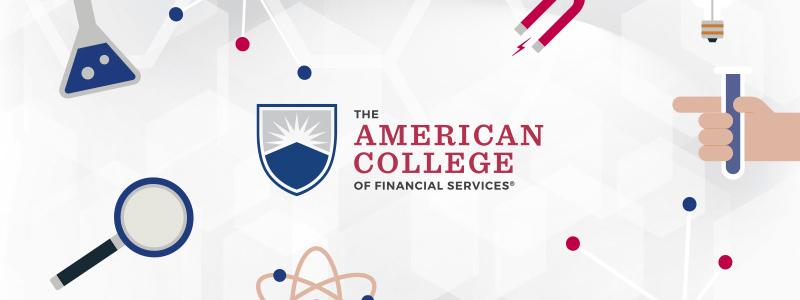
Research on ethical decision-making is often closely tied to gender. Some studies have concluded that women act more ethically than men in various business situations, including negotiating and recognizing unethical behavior. Research has also told us that when women are appointed to top management positions, there is a change in strategic approach from mergers and acquisitions to research and development, and organizations become more accepting of change.
The American College of Financial Services is committed to advancing women and ethical, evidence-based decision-making in financial services. Our Center for Women in Financial Services, led by Executive Director Hilary Fiorella, and our Cary M. Maguire Center for Ethics in Financial Services, led by Executive Director Azish Filabi, are delivering critical research to inform the financial services industry on how to better connect with consumers and build trust with all communities.
Join us as we honor the women in research at The College, working to deliver the insights needed to cultivate clarity and shape the future of financial services. These women include Domarina Oshana, PhD, Director of Research and Operations for the American College Center for Ethics in Financial Services, Timi Joy Jorgensen, PhD, Assistant Professor and Director of Financial Education and Well-Being, Kaylee Ranck, Research Director of The American College Center for Women in Financial Services, Martha Fulk, PhD, researcher, educator, and financial planner, Sophia Duffy, PhD, CPA, Associate Vice President of Curriculum Quality and Associate Professor of Business Planning, and Chia-Li Chen, PhD, Associate Provost, Graduate Programs.
I invite you to learn more about The College's women in research, their areas of focus, and how the insights they are gleaning are serving to change the face of financial services.
Subscribe to Newsletter
Related Posts
Ethics In Financial Services Insights
State Insurance Legislators at the Forefront of Regulating AI

On March 5, 2022, we had the privilege of presenting at the National Council of Insurance Legislators (NCOIL) Spring Meeting relating to the challenges of regulating artificial intelligence (AI)-enabled underwriting for life insurance. There’s been an increase in the use of AI in various insurance processes, including marketing, risk classification, and underwriting. As we’ve written before, these developments can create new opportunities for the industry, including increased access and improving pricing for consumers. However, they also create risks—particularly with respect to discrimination.
NCOIL is an organization comprised of legislators serving on state insurance and financial institutions committees around the U.S. In addition to serving as an educational forum for policymakers and the public on these topics, they write model laws on emerging topics from which States can benefit. We presented to the Financial Services and Multi-Lines Issues Committee, presided over by Vice-Chair Jim Dunnigan—a member of the Utah House of Representatives.
Our presentation was based on a paper we recently published in the NAIC Journal of Insurance Regulation, AI-Enabled Underwriting Brings New Challenges for Life Insurance: Policy and Regulatory Considerations. Based on our research, we proposed in the paper a multi-pronged governance approach to address the novel data sources, systems, and related risks of AI-driven insurance systems.
The first prong is to establish industry standards (derived from actuarial best practices) that are calibrated to the algorithm risks associated with the process. For instance, these standards could address accuracy in the data, the level of actuarial significance expected for data input, and related outcomes measures for how an algorithm performs. Prongs two and three of the governance framework require testing of the algorithm vis-à-vis the standards created. We believe the algorithm should be tested thoroughly, and that it should be certified to adhere to the agreed-upon standards before it is deployed. After it has been in use for a period of time, it should again be tested to determine whether it performed as expected.
A number of States have already addressed AI-enabled underwriting in insurance. Colorado passed an act in 2021 mandating that the state’s Insurance Commissioner establish rules requiring insurers to demonstrate technology, such as algorithms and predictive models, don’t unfairly discriminate based on race, color, national or ethnic origin, or a number of other protected categories. In Rhode Island, the state’s House of Representatives is considering a similar law that prohibits unfair discrimination in insurance processes when using external data sources or predictive modeling and algorithms.
The New York Department of Financial Services also addressed this topic in 2019 through a Circular Letter that expressly prohibited using criteria for underwriting purposes unless the insurer can establish the approach is not unfairly discriminatory pursuant to existing rules.
Our presentation was one of several sessions related to the impact of technology and related regulation on the insurance industry, demonstrating NCOIL’s commitment to lead regulatory efforts in this area. We are proud to have been a part of the discussion and look forward to continuing our work.
A Celebration of Black History in the Making

We continue to make significant strides, with many made recently, following America's reawakening to social and economic injustice, including:
- One-third of newly appointed independent directors to corporate boards in 2021 were Black - three times the number of new Black directors appointed in 2020 - as reported by the U.S. Spencer Stuart Board Index.
- The College's creation of the Center for Economic Empowerment and Equality with a plan, the Four Steps Forward initiative, to narrow the wealth gap and promote economic justice with lasting collective, community-focused solutions.
- Our Black Women, Trust, and the Financial Services Industry study that delivers evidence-based data for the financial services industry to better understand Black women's perception of financial services, their financial wants and needs, and the role they play as decision-makers in their households and communities.
Yet as we recognize our progress, we also acknowledge that the depths of Black history in financial services remain shallow from doors bolted shut for over 150 years to Black Americans. The numbers tell the story.
- According to Financial Times research released last year, Black representation among senior financial services positions barely held ground for over a decade at 2.62%.
- Less than 6% of financial advisors are African American.
- Additionally, while Black people represent 13% of Americans, there have only been 19 Black CEOs of Fortune 500 companies since 1955, representing less than 1%.
There is so much more work that needs to be done.
This month, The College celebrates today's Black pioneers in financial services: the Black innovators, leaders, and change-makers transforming the financial services industry and creating a new tomorrow for Black America - for all Americans.
Our list includes Sharon Bowen, the first Black woman to chair the New York Stock Exchange Board; Mellody Hobson, Chair of Starbucks Corporation and Co-CEO and President of Ariel Investments; and Thasunda Brown Duckett, President and CEO of TIAA. I invite you to join me in this celebration by learning more about some of today's Black history-makers here.
Together, let's celebrate Black History in the making!
Deepending Our Understanding to Better Assist Those Who Serve
A few weeks ago, I had the privilege to tour several key military sites with our Executive Director for the American College Center for Military and Veterans Affairs, James "Jim" Roy, PMP CMSAF #16 (retired), and our Senior Vice President of Business Development, David Stoeffel. The purpose of our tour was to deepen our understanding of how to better assist service members and their spouses, who are also students at The College, and build partnerships with others who are eager to support the military community.
We began our tour with a meeting at USAA headquarters with USAA Life Company leadership committed to supporting those who serve, including Brandon Carter, President of USAA Life Company. Next, we proceeded to the Noncommissioned Officer Academy (NCOA), where we met with Robert D. Gaylor. The NCOA is the second level of Enlisted Professional Military Education (EPME), after Basic Training, and prepares Technical Sergeants to be professional, war-fighting Airmen and Space Professionals.
We toured a US Air Force Base to look at USAF Basic Training to gain further understanding and respect for those who choose to serve in the US Military. In one dorm hung the Tuskegee Airmen emblem, which was an honor to see. We also had the exciting privilege to witness young men and women graduate from Air Force and Space Force Basic Training alongside their families.
Lastly, we visited the 149th Fighter Wing, also known as The Lone Star Gunfighters, whose mission is "To produce the finest airmen for global engagements and domestic operations." The 149th Fighter Wing is a Texas Air National Guard unit stationed at Kelly Field Annex, Joint Base San Antonio, Texas. Here I had a firsthand view and discussion with those who maintain and fly the F-16, deepening my appreciation of the precision required by these professional Airmen.
Our team's insights from these experiences will strengthen The College's initiatives focused on helping active duty, guard, reserve members, veterans, and their spouses, transition to civilian life and pursue career success in financial services.
We are privileged at The College to work alongside several veterans who are part of our team, including Jim, who I'm proud of for his work to advance and advocate for our heroes. This Memorial Day, I invite you to learn more about our Center for Military and Veterans Affairs, including the scholarship program and our upcoming 8th Annual Clambake & Soldier-Citizen Award scheduled for September 15 at the National Constitution Center in Philadelphia.
And to all those who have served and are currently serving, THANK YOU!
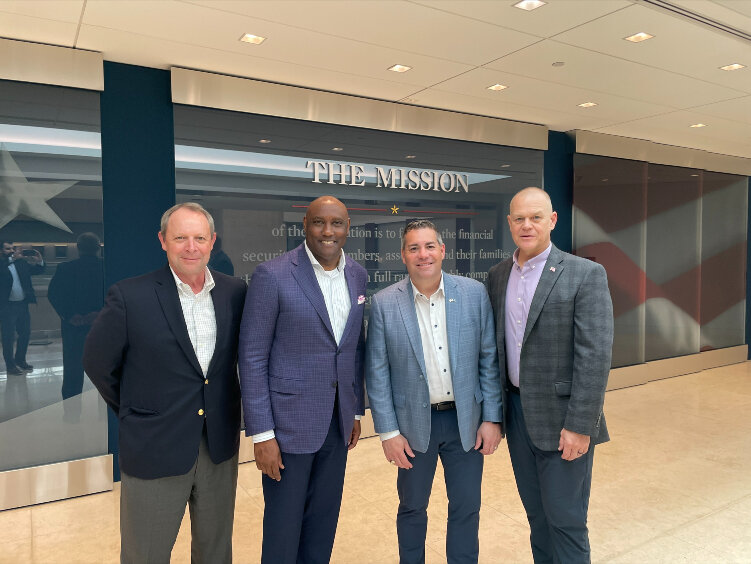
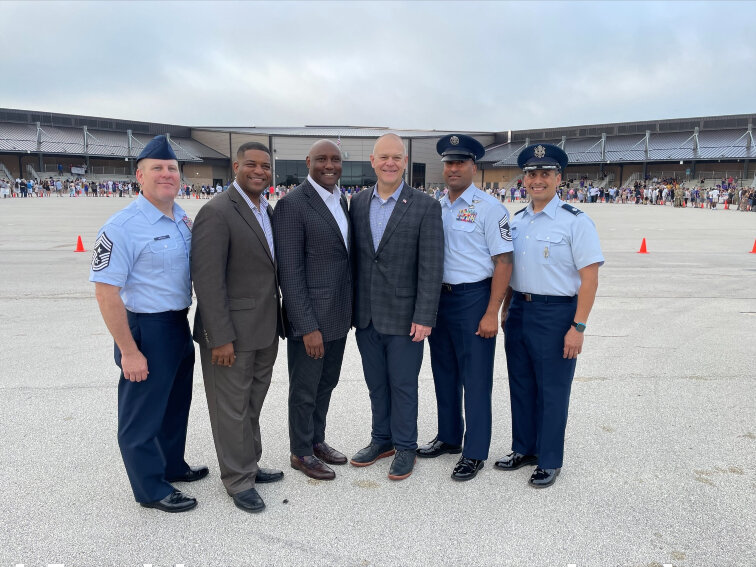
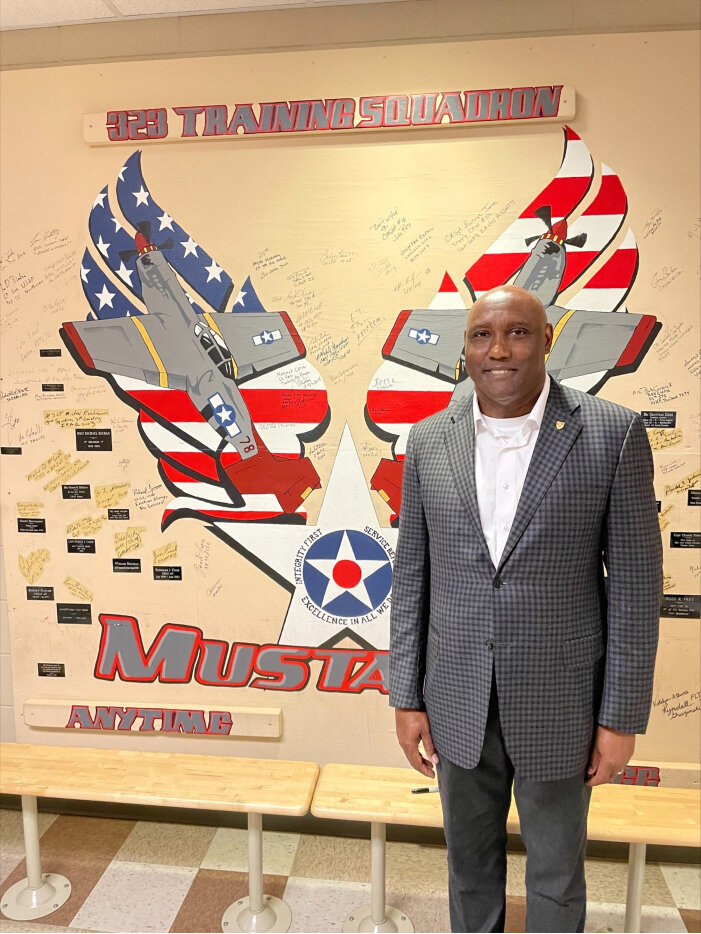
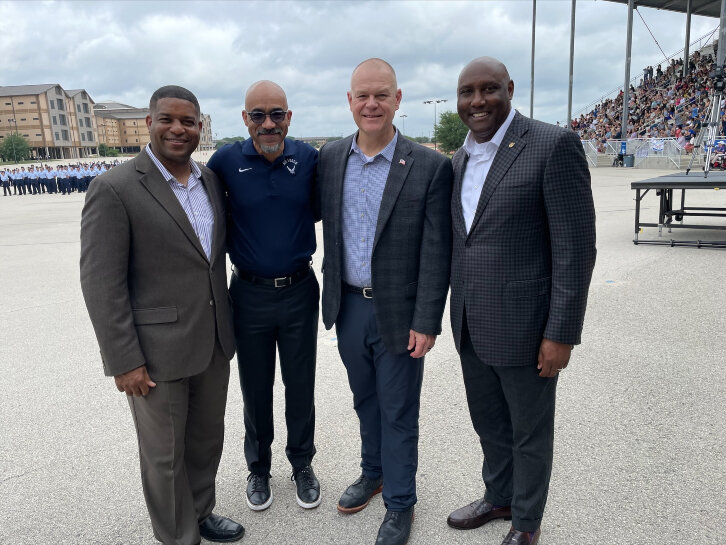
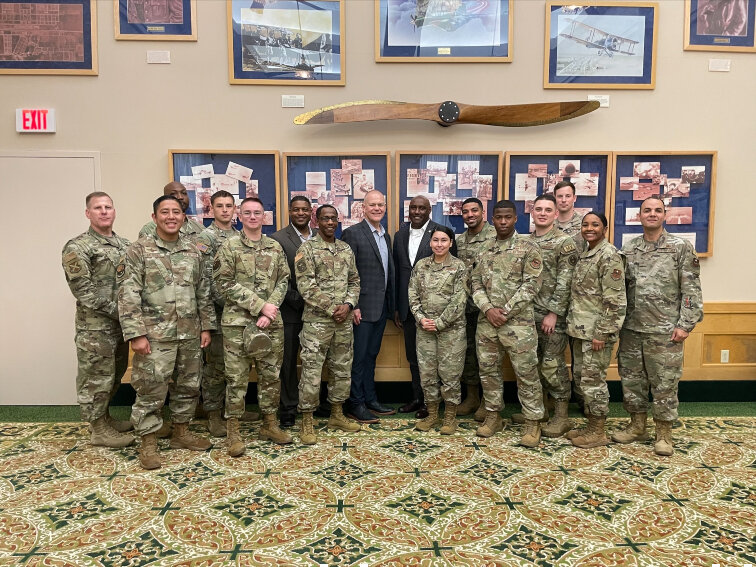
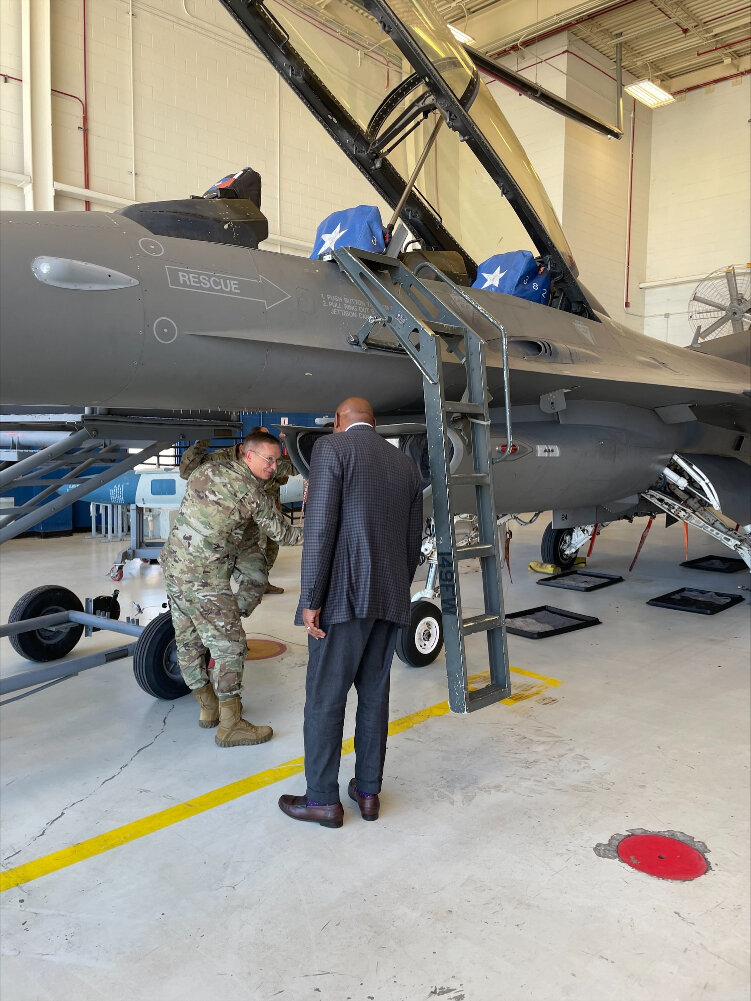
The President's Report 2021: Forging New Pathways to Trust in Financial Services

At The College, our mission remains the same today as it was in 1927: to benefit society by delivering applied financial knowledge and education. Our platform extends beyond financial professionals to profit and non-profit executive leaders, underserved communities, and consumers. As a steward of trust in the financial services industry, organizations have relied on us throughout history in their pursuit of “doing well by doing good.”
In our 2021 President's Report released last week, you can read about the innovative initiatives we have developed to help an industry forge new pathways to trust with their clients, veterans, and underserved communities, beginning with Black America. The President's Report will inform you on:
- New research soon to be released by the American College Cary M. Maguire Center for Ethics in Financial Services that changes how the industry measures and thinks about trust.
- An innovative executive leadership program developed by the American College Center for Economic Empowerment and Equality bridging the divide for Black executives in financial services.
- The ways behavioral finance affects how advisors do business, and research from Michael Finke, PhD, CFP®, that is preparing them for the future.
- What is now mission-critical for the American College Center for Military and Veterans Affairs with new Executive Director James Roy, PMP®, CMSAF (Ret.) at the helm.
We promise to keep you informed in the months ahead as these groundbreaking initiatives continue to be executed–and, as always, we welcome your support and involvement.
2022 Solomon S. Huebner Gold Medal Tribute: J. Scott Davison
Presented annually since 1975, The College’s Solomon S. Huebner Gold Medal is named for Solomon S. Huebner — a financial services, education, and insurance pioneer who founded The College in 1927. Individuals receiving the Solomon S. Huebner Gold Medal, the highest honor bestowed by The College, are those whose leadership and support have advanced the mission of The College in significant ways.
This year The College honors Davison, who is chairman, president, and CEO of OneAmerica, with this prestigious honor. As a College Board of Trustees member since 2011 and chairperson of the Board from 2020–2022, Davison helped lead The College into an exciting new era and continues to be a champion for diversity, equity, and inclusion in financial services.
Answer the Call to Serve Veterans with Us

One doesn't have to look far these days to see examples of the sacrifices made by a few to protect the many. The nightly news, with their broadcasts from the War in Ukraine, reminds us of the realities faced by those who enlist to defend their country's freedom.
Every day, our U.S. military is prepared to protect our liberties and to do so at any cost. While America's longest war has ended, our military continues to serve in dangerous conflicts overseas. They are often the first to arrive with much-needed humanitarian assistance when disaster strikes at home and abroad.
Those who serve allow us to proceed with our daily lives uninterrupted. We can enjoy our freedoms and pursue opportunities for personal prosperity. Yet, the nearly 200,000 men and women who return to civilian life each year face unique obstacles as they, too, strive to achieve prosperity.
Many require additional education to launch new careers or are inexperienced at conducting a job search, applying for, and interviewing for, a civilian job. Creating a resume and figuring out how to translate military skills and experience into transferable job skills can also be daunting.
We serve veterans because they deserve the same opportunities we've had the chance to pursue because of their sacrifice.
The American College Center for Military and Veterans Affairs seeks to help our military community overcome challenges transitioning to civilian life. We anticipate a record-breaking 425 scholarships to be awarded this year to military members and their spouses, including 120 scholarships for entry into our master's program last month. Our scholarship program is one of very few that extends this opportunity to military spouses, who also can struggle to find permanent careers after spending years relocating.
The Center's Executive Director, James "Jim" Roy, PMP®, has been working tirelessly to expand our services. In addition, under the leadership of Career Services Director Amanda Raymond, we are developing new services to help support the career progression of our military members and their spouses. Further initiatives we are exploring include the following:
- Partnering with organizations with military-affiliated employee resource groups
- Making the GI Bill and other federal funding streams available for designations for military members
- Awarding college credits for completed military consumer finance education
The Center has also partnered with McKinsey & Company to research how to attract more military members and their spouses into financial services and the impact on companies with military-trained employees.
We serve veterans at The American College of Financial Services and invite you to join us in this pursuit. Visit our Center for Military and Veterans Affairs to learn how to get involved in answering the call to serve veterans with us.
The Necessity of Sacrifice in Serving Others
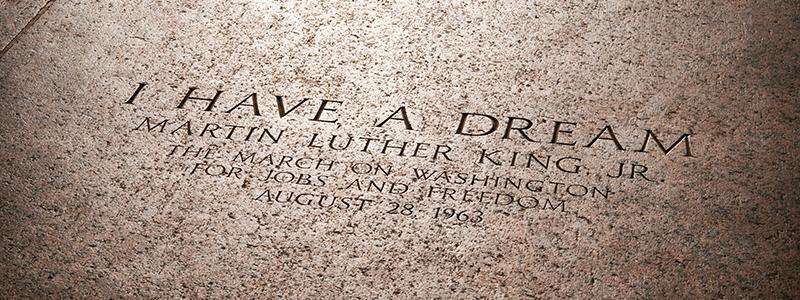
Even after surviving an almost fatal stabbing in 1958, King continued to lead the civil rights movement until his assassination in 1968. He sacrificed his life for a cause: a dream that he had that America could be better, do better, for the benefit of others. His adoption of nonviolent resistance to achieve equal rights for Black and Brown Americans earned him the Nobel Peace Prize in 1964.
King recognized the need to place others before self to propel society. In a speech he gave in 1957 in Montgomery, Alabama, he stated, "Life's most persistent and urgent question is, 'What are you doing for others?'"
I am often asked by people, "What should I do to celebrate MLK Day?" I respond with three suggestions taken from King's quotes and speeches. First, "Dream and dream big!" Follow your dreams and put them into action. Hopefully, those dreams include uplifting others. Second, ask yourself the question he posed in 1957: "What are you doing for others?" Then, go do something! Third, King also said, "The time is always right to do what is right." Go do right by others today and every day!
As the holiday approaches, thoughts of Dr. King's life of service lead me to think about the things, people, and causes I believe in. What and who do you believe in? Consider yourself, the ones you love, your community, and our great nation.
This holiday, let's do more praying, demonstrate more expressions of love, and make more sacrifices to help others. Let's work to change lives in any capacity and possibly inspire others in the process. In following his dream, King lived his life with the purpose of a higher calling that was more about others than it was about himself.
A New Leader Expands the Center for Military and Veterans Affairs’ Mission
With 2021 seeing the onboarding of a new executive director, a milestone in the number of scholarships awarded, and a landmark gift and continued partnership with Penn Mutual, the Center for Military and Veterans Affairs stands ready to extend its reach, offering even more scholarships, improving the lives of more military families, and acting as a trusted lifelong partner for students and alumni.
James A. Roy, PMP®, CMSAF (Ret.), was recently tapped to serve as the Center for Veterans Affairs’ new executive director. As the Chief Master Sergeant of the Air Force, Roy represented the highest level of leadership among noncommissioned officers in the U.S. Air Force—only the 16th service member in Air Force history appointed to such a position—and in his role, he provided direction for enlisted men and women as well as representing their interests to the American public and at all levels of government. He served as the personal advisor to the Chief of Staff and the secretary of the Air Force on all issues regarding the welfare, readiness, morale, and proper utilization and progress of the force.
His success soon carried over to an accomplished business career, where Roy most recently served as chief operating officer for Silotech Group, a company focused on advanced cyber, intelligence, IT, and modernization solutions. During the COVID-19 pandemic, Chief Roy brought on 20 new employees to the firm, expanded to three new business sectors as part of his vision to grow Silotech beyond small business status, and brought in nearly $20 million in annual revenue during a very turbulent time in U.S. history.
That mix of public service and private sector experience quickly caught the attention of The American College of Financial Services President and CEO George Nichols III in his search for an executive director who would be ready to build on the Center’s past successes and take it to new levels.
“Chief Roy has the exact vision and value set that’s needed to lead the Center as we give back to our honorable communities of service members and their loved ones. His service record and professional qualifications truly speak for themselves, and he’s the kind of leader we want on our team,” President Nichols says, adding that he has high hopes for Roy’s tenure at The College.
And Roy has already been making rapid inroads in his new role. The Center successfully hosted its annual clambake and award ceremony in September and, in addition to welcoming esteemed guests and speakers, took the opportunity to award its 1,000th student scholarship. Roy says that’s just the start, explaining that the Center has plans to greatly expand its financial outreach efforts. Roy hopes to award 400 annual scholarships in 2022 and beyond, a four-fold increase from its historical yearly average. The expansion effort was jump started by a critical grant from the Center for Veterans Affairs’ longtime partner and financial backer, The Penn Mutual Life Insurance Company, which announced a 10-year, $3 million contribution to fund scholarships, transition support, job placement programs, and other services.
Roy says veterans and the broader military community come with a skillset and ethos that’s already a natural fit for The College and the financial services industry that it serves.
“Veterans come with a set of core values that makes them comfortable operating in an environment that requires attention to detail, integrity, and an appreciation of all different cultures and backgrounds,” Roy said. “Especially in financial services, there is and always will be a real need for those individuals of integrity to help others as they address life’s major milestones with confidence and success.”
In addition to what will amount to be a record-setting year for student scholarship awards, the Center is currently in the process of further expanding The College’s eligibility for scholarships under the Post-9/11 GI Bill. Currently, only master’s degree programs qualify for GI bill funding, but Roy hopes that securing federal funding for some of The College’s designation programs as well will greatly expand The College’s reach into the military community, including possibly for active-duty personnel.
In addition to expanding scholarship offers and other outside funding, Roy’s other immediate focus is on growing The College’s overall footprint in the lives of veterans and their families, both during and after their time spent studying for their designations and degrees.
“What we want to offer is more than just an education or a designation. It’s a lasting commitment to be there as a steadfast, dependable partner as they progress through their post-military financial service careers,” Roy says.
To that end, Roy and his team, including Bonnie Weinberger, Rick Nail, and Nicole Jones, are building out an academic and career mentorship program, where students are partnered with leaders in the financial services industry.
“Our vision is a program where current students and recent graduates are connected with industry leaders – maybe they’re alumni of The College or veterans themselves, or maybe others who want to make an impact and the idea would be to not only help them get a foothold in the financial services industry, but to then help them progress past those first few years. The point is to get to where the student is really on solid ground,” Roy says. “It’s mentoring, it’s career coaching, it's a partnership where the student has someone to turn to, someone who has been in the industry for a while and can help make connections.”
Roy sees the program as a way for new entrees to gain access to what can be a niche industry.
“Once you have those first few cohorts up and running, I think you’ll soon see a system that quickly becomes self-sustaining. The former students can turn around and help the next group on their way up,” Roy adds.
The mentorship program is just one core pillar of an expanding mission undertaken by the Center, one that includes job placement and career guidance.
“I know that there are a lot of companies out there eager to hire highly talented, dedicated veterans. It’s really just a matter of us making those connections,” Roy says . “Fortunately, we’ve been able to rely on our partners — our institutional partners and supporters, but also our financial backers who help fund scholarships — as we work to carry out our mission to help veterans.”
To learn more about the Center for Military and Veterans Affairs, visit their website.